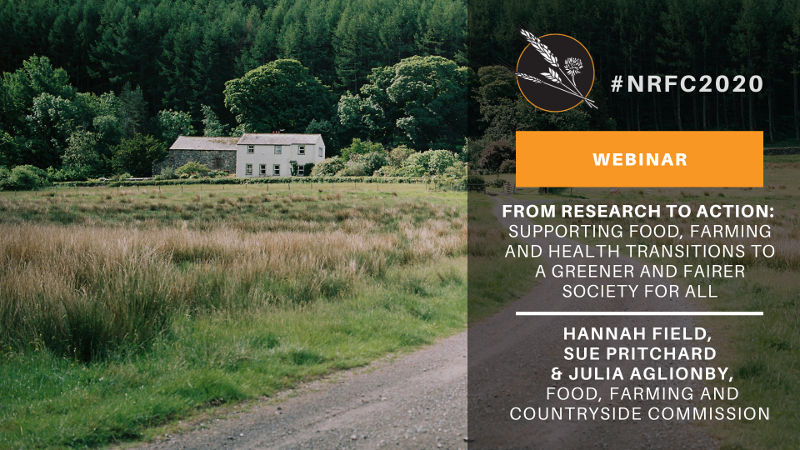We, The Food, Farming and Countryside Commission are turning the recommendations from the ‘Our Future in the Land’ report, developed over 2 years of participatory research, into practical actions with our partners in governments, businesses and communities. This is being supported through 6 place-based inquiries – 3 in England (Cumbria, Dartmoor, East of England), and 1 in each of Northern Ireland, Wales and Scotland, with funding from Esmée Fairburn Foundation. The recommendations are, at their core, focusing on connecting food, farming and the public’s health for a just transition to a greener, fairer economy in response to the climate, nature, health and now Covid-19 emergencies. To enable these actions, we are helping to convene collective leadership and collaboration across sectors and stakeholders.
This session focused on the Cumbria Inquiry and there were nearly 40 participants from various parts of Northern England and beyond, with people keen to learn from Cumbria and share ideas. We started the session with a visioning exercise that Hannah, the Cumbria Inquiry Coordinator, took the participants through. Hannah invited people to imagine what a particular part of Cumbria that they are familiar with might look, sound, smell, taste and feel like in 10 years’ time if actions had been taken to create vibrant and thriving communities, ecosystems and economy. Some examples of people’s visions included:
- “More diversity in the grasslands, trees on the hillsides, more diversity in the food produced – veg, fruit trees (the smell of the blossom in the spring), animals, even some grains and the local shops/pub sourcing from the valley.”
- “A vibrant, healthy, bountiful landscape, with people, community and variety.”
- More diversity in the landscape and more diverse people in it.
Sue Pritchard (Chief Exec, FFCC) introduced the FFCC’s national and place-based work that has happened and is happening including the three broad, key areas being looked at: convening collective leadership around contested issues, implementation of recommendations in the Our Future in the Land report, and resourcing resilient and adaptable communities. Julia Aglionby (Chair of the Cumbria Inquiry) and Hannah then introduced the Cumbria Inquiry more specifically, where broad areas for action that are being discussed include feeding into a routemap to ELMS, piloting the National Nature Service, supporting better health and wellbeing through inclusive access to the countryside and getting local food to market. We had a poll to see where the support was for these ideas, and it was essentially evenly distributed across the board.
There were rich and diverse discussions around these four areas of work had in the breakout rooms. Some points made were:
- National Nature Service is designed to be a movement- building initiative to deal with a critical issue (like the NHS was at its inception) that provides employment, training and volunteering opportunities to recover and restore nature, whilst designing and growing the green jobs of the future.
- Training in land and nature skills with ecology as a fundamental underpinning – the loss of Newton Rigg as an opportunity to reimagine agricultural education
- Need to inform farmers about the benefits of growing better food.
- Being realistic about land ownership and power over decision making in farming, farm income on marginal lands and ow to incentivise change.
- Seeing Cumbria as a centre for wellbeing and recovery, but ensuring that the benefits of visitors were re invested in landscape and farming and skilled jobs for people working on the land and being able to make a good living form that
- Supporting aspiration in farming and rural communities.
- Farmer and community led examples like Danny Teasdale (Ullswater CIC) are a great model – how do we find more and scale up?
There are other great insights from the discussions, too many to list here. There was much resonance with the other conversations we have had in Cumbria as well as new points to consider. These will become part of our reporting on the Cumbria Inquiry, and will be shared with and fed into the stakeholder groups’ conversations in Cumbria.
If anyone would like to follow the FFCC’s work or hear more about the Cumbria Inquiry, there are some twitter accounts to follow and Hannah’s email address:
hannah.field@uni.cumbria.ac.uk
FFCC website for reports, blogs (conversations) and more: ffcc.co.uk/
FFCC Our Future in the Land report: ffcc.co.uk/library/our-future-in-the-land
@hannah_thelakes @FFC_commission @suepritch
You can watch a recording of the session here.

